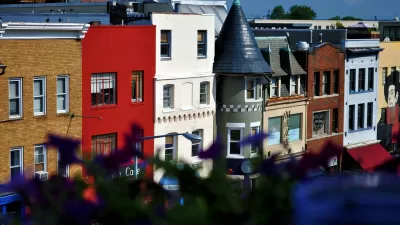In this article from Next American City, Josh Stephens looks at the role convention centers play in cities, the high hopes cities have for them, and the often poor returns they offer.
Convention centers may not be the cash cows cities typically think of them as, according to this piece. Attendance at convention centers is on the decline, but cities continue to build them. And despite their appeal as magnets for tourism dollars, the actual returns show that cities haven't been seeing a great benefit from this mega projects.
"The story of convention centers is that, for all cities do to distinguish themselves, the convention industry treats cities not as places but rather as spaces - fungible, interchangeable and characterless. Even though convention centers are marketed with Platonic conceptions of cities (palm trees, skyscrapers, longhorns, slot machines), the convention economy is one of placelessness. 'Most of them have removed themselves from the community they're in by virtue of becoming developments that are about drawing people into the city, not about being integrated in the city culture and fabric,' says Fred Kent, president of the Project for Public Spaces, which advocates for attractive, energized public spaces.
Even so, convention centers might seem tolerably innocuous - they don't pollute (directly), they don't bulldoze historic neighborhoods (usually), and they pay for themselves - except when they don't."
FULL STORY: Unconventional Thinking

Alabama: Trump Terminates Settlements for Black Communities Harmed By Raw Sewage
Trump deemed the landmark civil rights agreement “illegal DEI and environmental justice policy.”

Planetizen Federal Action Tracker
A weekly monitor of how Trump’s orders and actions are impacting planners and planning in America.

The 120 Year Old Tiny Home Villages That Sheltered San Francisco’s Earthquake Refugees
More than a century ago, San Francisco mobilized to house thousands of residents displaced by the 1906 earthquake. Could their strategy offer a model for the present?

In Both Crashes and Crime, Public Transportation is Far Safer than Driving
Contrary to popular assumptions, public transportation has far lower crash and crime rates than automobile travel. For safer communities, improve and encourage transit travel.

Report: Zoning Reforms Should Complement Nashville’s Ambitious Transit Plan
Without reform, restrictive zoning codes will limit the impact of the city’s planned transit expansion and could exclude some of the residents who depend on transit the most.

Judge Orders Release of Frozen IRA, IIJA Funding
The decision is a victory for environmental groups who charged that freezing funds for critical infrastructure and disaster response programs caused “real and irreparable harm” to communities.
Urban Design for Planners 1: Software Tools
This six-course series explores essential urban design concepts using open source software and equips planners with the tools they need to participate fully in the urban design process.
Planning for Universal Design
Learn the tools for implementing Universal Design in planning regulations.
Clanton & Associates, Inc.
Jessamine County Fiscal Court
Institute for Housing and Urban Development Studies (IHS)
City of Grandview
Harvard GSD Executive Education
Toledo-Lucas County Plan Commissions
Salt Lake City
NYU Wagner Graduate School of Public Service




























